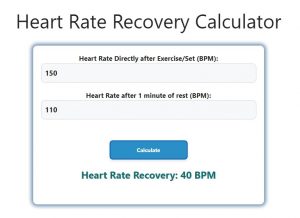About Heart Rate Recovery Calculator (Formula)
Heart rate recovery (HRR) is a vital measure of fitness and cardiovascular health. It reflects how quickly your heart rate returns to its resting state after intense physical activity. A faster recovery time typically indicates better heart health and fitness levels, making HRR an important metric for athletes and fitness enthusiasts alike. Calculating your HRR can give you insights into how well your heart is functioning under physical stress.
Formula
The formula to calculate heart rate recovery is:
Heart Rate Recovery (HRR) = Heart Rate Directly after Exercise/Set (BPM) – Heart Rate after 1 minute of rest (BPM)
In this formula:
- Heart Rate Directly after Exercise: The number of beats per minute (BPM) immediately after completing a set of exercise.
- Heart Rate after 1 minute of rest: The BPM measured after 1 minute of recovery from the exercise.
How to Use
- Measure Heart Rate after Exercise: After completing an intense workout or set, immediately measure your heart rate (BPM).
- Wait for 1 Minute: After resting for one minute, measure your heart rate again.
- Apply the Formula: Subtract the heart rate after rest from the heart rate immediately after exercise to get your heart rate recovery.
- Interpret the Results: A higher HRR indicates better cardiovascular health and recovery ability.
Example
If your heart rate immediately after exercise is 150 BPM and your heart rate after 1 minute of rest is 110 BPM, then your heart rate recovery is calculated as:
HRR = 150 BPM – 110 BPM = 40 BPM
A recovery of 40 BPM indicates a good level of fitness.

FAQs
- What is heart rate recovery?
Heart rate recovery is the difference between your heart rate immediately after exercise and your heart rate after 1 minute of rest. - Why is heart rate recovery important?
HRR provides insights into your cardiovascular health and fitness levels. Faster recovery typically indicates a healthier heart. - How is heart rate recovery calculated?
HRR is calculated by subtracting the heart rate after 1 minute of rest from the heart rate immediately after exercise. - What is a good heart rate recovery?
A drop of 20 BPM or more after 1 minute of rest is considered a good heart rate recovery. - What does poor heart rate recovery indicate?
Poor heart rate recovery can indicate potential cardiovascular issues and may require medical attention. - Does heart rate recovery improve with training?
Yes, consistent cardiovascular training can improve heart rate recovery over time. - How often should I measure my heart rate recovery?
It’s recommended to measure HRR after intense workouts or at regular intervals to track progress. - What factors affect heart rate recovery?
Age, fitness level, hydration, sleep quality, and overall health can all affect HRR. - Can stress impact heart rate recovery?
Yes, high stress levels can slow down heart rate recovery. - Does dehydration affect heart rate recovery?
Yes, dehydration can lead to slower heart rate recovery, as the body struggles to stabilize after exercise. - How is HRR linked to overall fitness?
Better HRR is generally associated with improved cardiovascular fitness, endurance, and overall health. - Is heart rate recovery the same for everyone?
No, HRR varies based on individual fitness levels, age, and health conditions. - Can heart rate recovery be too fast?
Generally, a faster recovery is a positive sign, but extremely fast drops in heart rate could also indicate underlying issues. - How can I improve my heart rate recovery?
Regular exercise, proper hydration, a balanced diet, and stress management can all help improve HRR. - Is heart rate recovery affected by medication?
Yes, certain medications, such as beta-blockers, can affect how quickly your heart rate recovers after exercise. - Can heart rate recovery predict health risks?
Studies suggest that poor HRR is linked to a higher risk of cardiovascular disease and mortality. - Should I be concerned if my HRR is low?
If your HRR is consistently low, it might be a good idea to consult with a healthcare provider to assess your cardiovascular health. - What equipment is needed to measure HRR?
A simple heart rate monitor or even manually measuring your pulse can help track your HRR. - What is the normal heart rate recovery range?
For most people, a recovery rate of 20 to 30 BPM after 1 minute is considered normal. - Does heart rate recovery decline with age?
Yes, as we age, HRR typically slows down, but regular exercise can help maintain it at a healthy level.
Conclusion
Heart rate recovery is a valuable tool for assessing your cardiovascular fitness and overall health. By measuring how quickly your heart rate returns to normal after exercise, you can gain insights into your body’s ability to handle physical stress. Using the simple formula, HRR = Heart Rate Directly after Exercise – Heart Rate after 1 minute of rest, you can easily track your progress and make informed decisions to improve your fitness and health over time.
Related:
